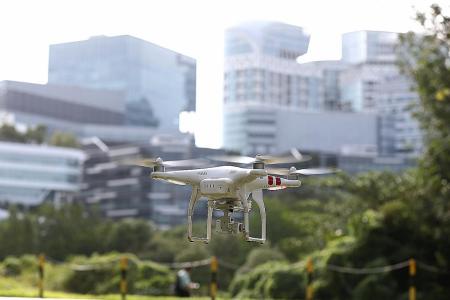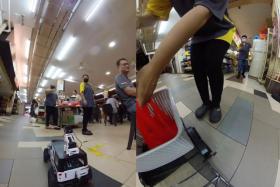Laws, technology and education can help regulate drones: Experts
With drones becoming more common, measures must be taken to regulate their use and ensure these devices do not disrupt air traffic in Singapore, say industry observers.
The use of technology and regulations could help mitigate the issue, they added.
The Civil Aviation Authority of Singapore (CAAS) revealed on Wednesday that 37 scheduled flights had been delayed after unauthorised drones were spotted flying near Changi Airport.
The operations of one of the airport's two runways were also suspended intermittently between 11pm on Tuesday and 9am on Wednesday. A multi-agency team made up of the CAAS, Changi Airport Group, Singapore Armed Forces and the police was activated for search-and-locate operations.
The flying of drones within 5km of airports or military airbases, or at altitudes above 200 feet (61m), without a permit is an offence. Those found guilty face a fine of up to $20,000 or up to 12 months in jail, or both.
Last December, unauthorised drones disrupted flights at London's Gatwick Airport for three days, affecting about 140,000 passengers and 1,000 flights. Drones also affected flights from London's Heathrow airport and Newark in the United States in January.
Aviation industry consultant Priveen Raj Naidu said that there are "huge communities" of drone pilots who use the devices for various reasons. As such, similar incursions into restricted airspace are likely to continue unless more defined perimeters are drawn up.
"From a safety perspective, drones coming into airport airspace could prove very dangerous, as they could impede aircraft on their final approach or take-off," said Mr Priveen, adding that such incidents could cause serious damage to the aircraft and their engines.
Mr Mark Yong, chief executive of drone operations platform and solutions firm Garuda Robotics, said: "With drones becoming more accessible and demand for them increasing, the continued safe operation of drones in our tight and dense airspace will rely on regulations, technology and education."
The introduction of a nationwide "unmanned aircraft system traffic management" platform could allow for drones to be monitored in real-time, he said.
Researchers at the Nanyang Technological University are looking into the possibility of such a traffic management system for drones here.
"Mandatory drone and pilot registration, coupled with tracking modules on board all drones, will allow the rapid identification and authorisation of lawful drone operators within the platform," said Mr Yong.
Get The New Paper on your phone with the free TNP app. Download from the Apple App Store or Google Play Store now



